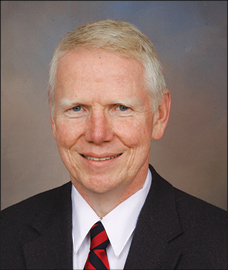
James Linn, MD (Submitted photo)
The medical field — especially the discipline of obstetrics and gynecology — may not appear to be a particularly friendly environment for faithful Catholics these days.
A cursory Google search that includes any combination of the words “Catholic,” “OBGYN,” “abortion” and “referral,” will provide a glimpse into the national debate that rages over conscience protection legislation at both the state and federal levels. Even when healthcare professionals are legally excluded from the obligation to participate directly in performing abortions, there is often considerable pressure for these same professionals to refer their patients for abortions and other treatments that they consider morally objectionable.
The matter becomes even more complicated when discussing the prescription of hormonal birth control, which is prohibited by the Catholic Church, but overwhelmingly accepted and promoted by the mainstream culture, including many other Christian religions.
Regardless, Catholic doctors faithful to the teaching of the Church are obliged to be, as Pope Paul VI wrote in the encyclical Humanae Vitae, “signs of contradiction,” in the same way that their Lord was.That doesn’t mean it’s always easy. “The extreme view that is out there is, if you don’t do abortions and don’t refer for abortions, you shouldn’t be practicing OBGYN; you should be a radiologist or something,” said Dr. James Linn, a board-certified obstetrician and gynecologist in group practice at Columbia St. Mary’s in Milwaukee. “And if you don’t prescribe contraception, you really are crazy — you definitely should not be an OBGYN — that’s the established view.”
But Linn is not only a second-generation OBGYN in practice since 1984, he is also a lifelong Catholic and attendee of daily Mass — and the two identities are not only intertwined but complementary.
Simply put, his ability to be a good doctor is dependent on his ability to be a faithful servant of God.
“I do try to bring my faith to work — I sometimes fail miserably, of course — just ask my colleagues,” said Linn, who is also a member of the American Association of Pro-Life OBGYNs (AAPLOG).
But nonetheless, he said his ultimate goal is “to treat every patient with the knowledge and belief that I am treating our Lord,” and he tries to begin each day by reciting the prayer of St. Francis de Sales: “Lord, I give you this day. I offer you now all the good I shall do, and promise to accept, for the love of you, all the difficulty I shall meet. Help me conduct myself in a manner pleasing to you.”
And if that means being perceived as “countercultural” by others, said Linn, that’s just part of the Gospel call.
“The teachings of the Catholic Church on sexuality, contraception and abortion are certainly countercultural, but they are rooted in natural law and God’s plan for our happiness,” Linn said.
He urges Catholics interested in the field of obstetrics and gynecology not to be intimidated by the prevailing secular belief that providing access to abortion and contraception is material to also providing good healthcare.
“I don’t prescribe contraception, so when a patient asks about birth control I have an opportunity to tell her why I don’t prescribe it,” he said. “There is strong evidence that most hormonal contraceptives — the IUD, the Pill, the patch, the NuvaRing, hormonal implants — interfere at least some of the time with implantation, causing the death of the already conceived human embryo.”
Instead, Linn will share with his patients resources about Natural Family Planning (NFP), an umbrella term referring to methods of monitoring physiological signs in a woman’s body to determine the time of ovulation. When a couple “charts” or keeps track of these signs, pregnancy can either be avoided or achieved, and other health concerns can also be identified that might otherwise be masked by the prescription of contraception and the synthetic hormones it contains.
“Of course, she is free to use whatever birth control she wants, but the bottom line is, I won’t prescribe something that’s not good for her, that I would not prescribe for my daughter,” said Linn.
It’s not a viewpoint that is often shared in OBGYN offices, he acknowledged. While most of his colleagues don’t care what he tells his patients, “they have the same view that the culture has, that a pill is easier, more reliable. NFP is not always easy for people — the reality is, it’s got some challenges and people would rather have a simple shot, pill or implant that they don’t have to think about.”
Fertility and pregnancy, when viewed in a Catholic light, are “gifts from God, not diseases to be treated or prevented with drugs and devices and operations,” said Linn.
That’s an attitude manifest in the joy of his vocation as an OBGYN, working alongside men and women who are bringing new life into the world. “I enjoy the fun and excitement of helping deliver babies,” he said. “It’s not like everybody I talk to ends up agreeing with me, but I plant seeds and I offer some information they can think about, and I think we’re all called to be Christ to the world and you do the best you can, and the Holy Spirit does the rest.”
